13个句型记住全部语法
- 格式:doc
- 大小:30.00 KB
- 文档页数:5

高考英语13个语法考点介绍:1、as句型(1)as引导方式状语从句句型:“按照……正如…例:As(it is)in your country, we grow wheat in the north and rice in the south正如(像)你们国家一样,我们北方种植小麦,南方种植水稻。
(2)as+形容词/副词原级+(a/an)+名词+as;否定式:not as/sO---as。
1:He is as good a player as his sister他和他姐姐一样是位优秀的运动员;2、prefer句型preter to do sth例:I prefer to stay at home我宁愿呆在家里。
(2)prefer doing sth。
例:I prefer playing in defence我喜欢打防守;3、when句型:(1)be doing sth. when。
例:He was still smiling when the door opened and his wife came in他正笑着的时候门突然开了,他妻子走了进来。
(2)be about to do sth . . when 例:We were about to start when it began to rain我们刚要出发,天就开始下雨了;4、seem句型:(1)It+ seems+that从句19J:It seemed that everyone was satisfied看来好像每个人都很满意(2)It seems to sb tha f:It seems to me that she is right我看她是对的;5、表示“相差…;增加了……;增加到句型。
(1)She is taller than i by three inches她比我高三英寸。
(2)There is one year between us我们之间相差一岁;6、What引导的名词性从句:(1)What引导主语从句,例What surprised me is that everybody seemed to be very indifferent to her让我吃惊的是每个人似乎对她都很冷淡;7、too句型:(1)too…todo…,例:Politics is too important to be left to the politicians. (=Politics is so important that it can't be left to the politicians.政治太重要了,不能由政治家来决定;8、where句型,(1)where引导的定语从句。

英语语法记忆口诀 Modified by JACK on the afternoon of December 26, 2020英语语法记忆口诀1、一般现在时一般现在时态中,动词一般用原形。
表述事实讲真理,习惯动作常发生。
动词词尾加-s(es),只表单数三人称。
若变一般疑问句,得看句型是哪种。
系表结构和there be, be放句首可完成;若遇实义动词句,do或does莫忘用!2、现在进行时Look, Listen是标志,现在进行正发生;有时now在句中现,“be+v-ing”时态成。
若问be用何形式,须看主语数、人称。
He / She is, I am. We, you, they后are紧跟。
v-ing形式更好记,三种构成要分清。
一般问句be提前,be后加not否定成!3、基数词变序数词基变序,很容易,一二三,特殊记,th从四起。
八去t来九去e,遇到ve,f 替,ty变为tie,后加th莫迟疑,若想表示几十几,只变个位就可以。
时间介词巧记歌年、月、季节前须用in,(如:in 2008, in September, in spring)日期前面行不通。
遇到几号改用on,(如:on January 1)上午、下午、晚上仍用in。
(如:in the morning/afternoon/evening) 若是某日上下午,也是用on才能行。
(如:on the evening of the Mid-autumn Day)正午、夜里用at,(如:at noon, at night)时、分用法也同理。
(如:, at two, at two)如若“差”点须加to,(如:two to two)如若“过”点改past。
(如:half past one)多说勤练牢牢记,学好英语非儿戏。
4、谓语be的用法我用am,你用are除此之外的单数包括他她还有它统统都是用is我们你们和他们只要复数都用are5、一般疑问句和否定句的变化一般问句并不难,谓语调到主语前。
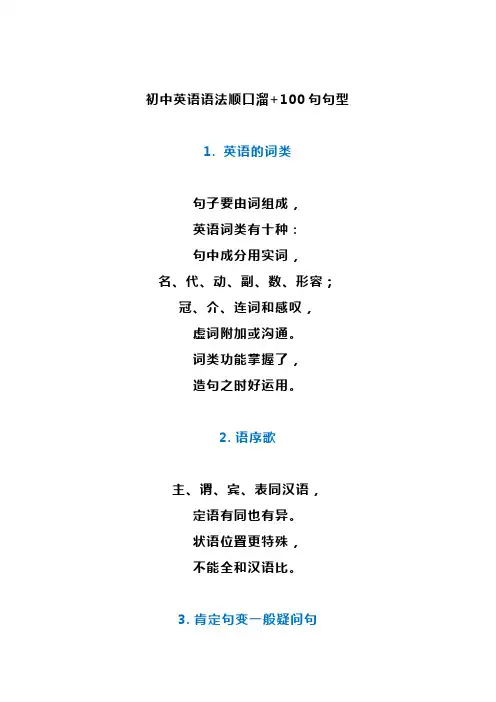
初中英语语法顺口溜+100句句型1. 英语的词类句子要由词组成,英语词类有十种:句中成分用实词,名、代、动、副、数、形容;冠、介、连词和感叹,虚词附加或沟通。
词类功能掌握了,造句之时好运用。
2.语序歌主、谓、宾、表同汉语,定语有同也有异。
状语位置更特殊,不能全和汉语比。
3.肯定句变一般疑问句have和be提句首,其它助词Do开头。
时间、人称由do变,动词只把原形留。
谓语助词有几个,第一助词提句首。
4. 肯定句变否定句否定句中加not,放在be和have后。
其它要加动词do,do的后面加not,时间、人称由do变,动词原形总保留。
谓语若是助词多,not紧跟第一个。
5.名词的所有格名词只变数,不分主宾格。
人和动物类,可变所有格。
撇(’)后加s,相当汉语“的”。
时间、距离等,也变所有格。
6. 名词变复数单数变为复数式,加上“s”统言之。
下列结尾名词后,要加“s”先加“e”:发音[∫][t∫][s]和[z],或是辅音加“o”时。
有些名词变复数,词尾变化要注意:“y”前字母是辅音,一律变“y”为“ie”;遇到“f / fe”,有时需要变“ve”少数名词不规则,特别情况靠硬记。
7. 时间名词前所有介词的速记年月周前要用in,日子前面却不行。
遇到几号要用“on”,上午下午又是“in”。
要说某日上下午,用on 换in 才能行。
午夜黄昏用at,黎明用它也不错。
at 也在时分前,说“差”用to,说“过”要用past。
8.介词用法歌介词加宾语,才能有实意。
表、定、状、宾、补,词组在句里。
9. 介词顺口溜in 在……里,out 在……外,在旁边的是beside,靠近的为by。
on 在……上,under 在……下,above 在上头,below 在底下。
10. be的用法歌动词be,变化大,“I”用“am”“You”用“are”,Is用于它(it)、他(he)、她(she) 复数一定要用“are”,切莫用错闹笑话。
11. 动词的时态四种时间各四式,联想对比便于记。
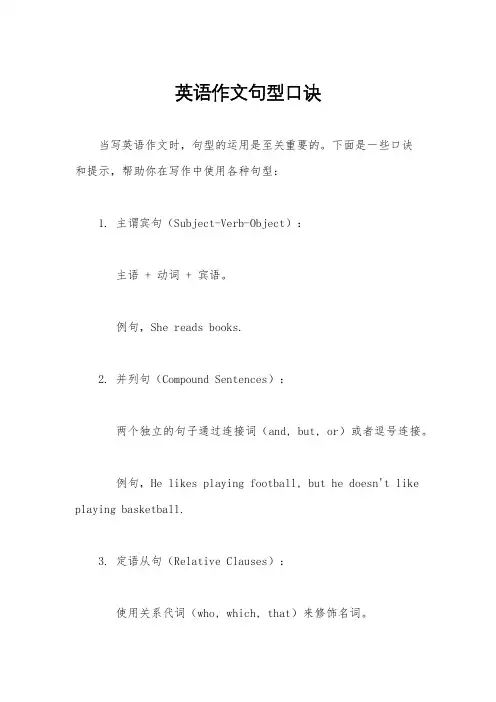
英语作文句型口诀当写英语作文时,句型的运用是至关重要的。
下面是一些口诀和提示,帮助你在写作中使用各种句型:1. 主谓宾句(Subject-Verb-Object):主语 + 动词 + 宾语。
例句,She reads books.2. 并列句(Compound Sentences):两个独立的句子通过连接词(and, but, or)或者逗号连接。
例句,He likes playing football, but he doesn't like playing basketball.3. 定语从句(Relative Clauses):使用关系代词(who, which, that)来修饰名词。
例句,The girl who is wearing a red dress is my sister.4. 状语从句(Adverbial Clauses):通过连接词(when, while, although, because)引导,表示时间、原因、条件等。
例句,Although it was raining, they still went out for a walk.5. 倒装句(Inversion):将谓语动词放在主语之前,通常出现在条件句或者否定词开始的句子中。
例句,Not only did he pass the exam, but he also got the highest score.6. 比较句(Comparative Sentences):使用形容词或副词的比较级来表达两者之间的关系。
例句,She is taller than her sister.7. 被动语态(Passive Voice):将动作的接受者放在主语的位置,强调动作的接受者而非执行者。
例句,The book was written by Shakespeare.8. 倒装条件句(Inverted Conditional Sentences):条件句的条件部分放在句首,谓语动词之后。
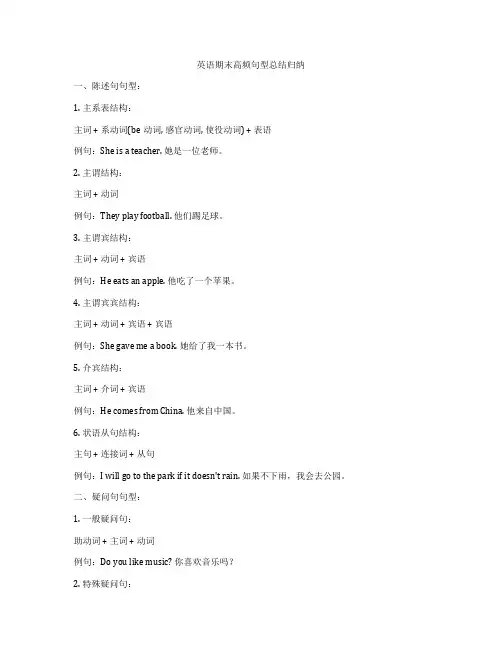
英语期末高频句型总结归纳一、陈述句句型:1. 主系表结构:主词 + 系动词(be动词, 感官动词, 使役动词) + 表语例句:She is a teacher. 她是一位老师。
2. 主谓结构:主词 + 动词例句:They play football. 他们踢足球。
3. 主谓宾结构:主词 + 动词 + 宾语例句:He eats an apple. 他吃了一个苹果。
4. 主谓宾宾结构:主词 + 动词 + 宾语 + 宾语例句:She gave me a book. 她给了我一本书。
5. 介宾结构:主词 + 介词 + 宾语例句:He comes from China. 他来自中国。
6. 状语从句结构:主句 + 连接词 + 从句例句:I will go to the park if it doesn't rain. 如果不下雨,我会去公园。
二、疑问句句型:1. 一般疑问句:助动词 + 主词 + 动词例句:Do you like music? 你喜欢音乐吗?2. 特殊疑问句:特殊疑问词 + 助动词 + 主词 + 动词例句:What is your name? 你的名字是什么?3. 反意疑问句:陈述句 + 反意疑问句例句:You are a student, aren't you? 你是学生,对吗?三、否定句句型:1. 否定副词结构:主词 + 动词 + 否定副词例句:I don't like coffee. 我不喜欢咖啡。
2. 否定词结构:主词 + 动词 + 否定词 + 宾语例句:She didn't eat the apple. 她没有吃那个苹果。
四、祈使句句型:1. 祈使句结构:动词 + 其他例句:Open the window. 打开窗户。
五、感叹句句型:1. 感叹句结构:感叹词 + 主系表结构 / 主谓结构例句:What a beautiful sunset! 多美的日落啊!六、强调句句型:1. 强调句结构:It is + 被强调部分 + that / who + 其他部分例句:It is Mary who won the prize. 是玛丽获得了奖项。
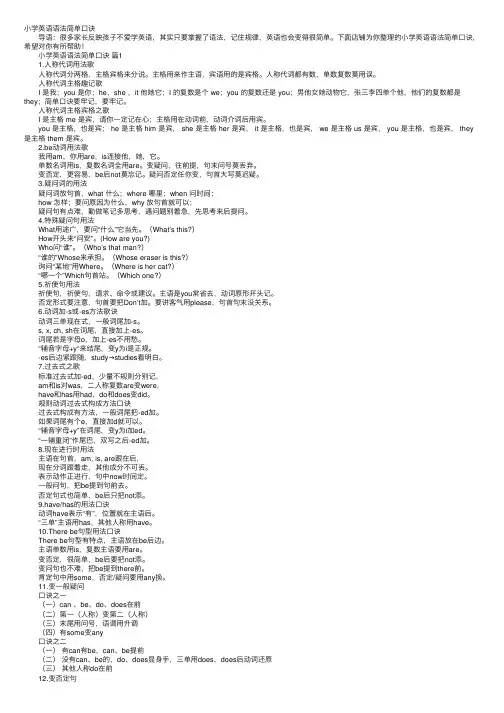
⼩学英语语法简单⼝诀 导语:很多家长反映孩⼦不爱学英语,其实只要掌握了语法,记住规律,英语也会变得很简单。
下⾯店铺为你整理的⼩学英语语法简单⼝诀,希望对你有所帮助! ⼩学英语语法简单⼝诀篇1 1.⼈称代词⽤法歌 ⼈称代词分两格,主格宾格来分说。
主格⽤来作主语,宾语⽤的是宾格。
⼈称代词都有数,单数复数莫⽤误。
⼈称代词主格趣记歌 I 是我;you 是你;he,she ,it 他她它;I 的复数是个 we;you 的复数还是 you;男他⼥她动物它,张三李四单个他,他们的复数都是they;简单⼝诀要牢记,要牢记。
⼈称代词主格宾格之歌 I 是主格 me 是宾,请你⼀定记在⼼;主格⽤在动词前,动词介词后⽤宾。
you 是主格,也是宾; he 是主格 him 是宾, she 是主格 her 是宾, it 是主格,也是宾, we 是主格 us 是宾, you 是主格,也是宾, they 是主格 them 是宾。
2.be动词⽤法歌 我⽤am,你⽤are,is连接他,她,它。
单数名词⽤is,复数名词全⽤are。
变疑问,往前提,句末问号莫丢弃。
变否定,更容易,be后not莫忘记。
疑问否定任你变,句⾸⼤写莫迟疑。
3.疑问词的⽤法 疑问词放句⾸,what 什么;where 哪⾥;when 问时间; how 怎样;要问原因为什么,why 放句⾸就可以; 疑问句有点难,勤做笔记多思考,遇问题别着急,先思考来后提问。
4.特殊疑问句⽤法 What⽤途⼴,要问“什么”它当先。
(What’s this?) How开头来“问安”。
(How are you?) Who问“谁”。
(Who’s that man?) “谁的”Whose来承担。
(Whose eraser is this?) 询问“某地”⽤Where。
(Where is her cat?) “哪⼀个”Which句⾸站。
(Which one?) 5.祈使句⽤法 祈使句,祈使句,请求、命令或建议。
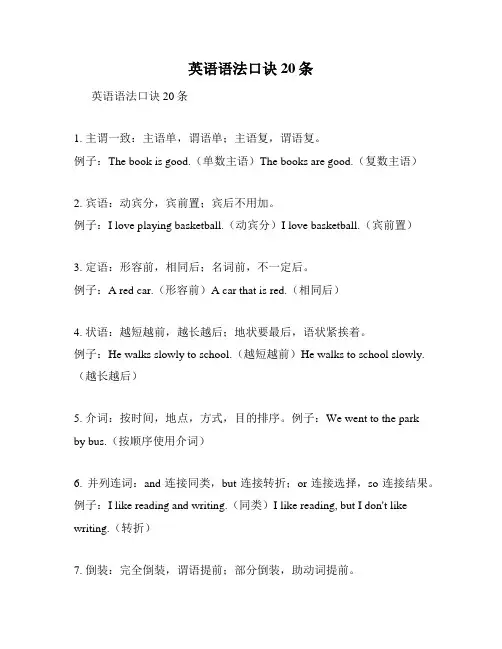
英语语法口诀20条英语语法口诀20条1. 主谓一致:主语单,谓语单;主语复,谓语复。
例子:The book is good.(单数主语)The books are good.(复数主语)2. 宾语:动宾分,宾前置;宾后不用加。
例子:I love playing basketball.(动宾分)I love basketball.(宾前置)3. 定语:形容前,相同后;名词前,不一定后。
例子:A red car.(形容前)A car that is red.(相同后)4. 状语:越短越前,越长越后;地状要最后,语状紧挨着。
例子:He walks slowly to school.(越短越前)He walks to school slowly.(越长越后)5. 介词:按时间,地点,方式,目的排序。
例子:We went to the parkby bus.(按顺序使用介词)6. 并列连词:and连接同类,but连接转折;or连接选择,so连接结果。
例子:I like reading and writing.(同类)I like reading, but I don't like writing.(转折)7. 倒装:完全倒装,谓语提前;部分倒装,助动词提前。
例子:Out came the sun.(完全倒装)Never have I seen such a beautiful view.(部分倒装)8. 虚拟语气:if从句用虚拟,主句用would/could/should。
例子:If I were you, I would go to bed early.(if从句用虚拟)9. 间接引语:直接引语变间接,人称,时间,地点要变。
例子:He said, "I'm busy now."(直接引语)He said that he was busy then.(间接引语)10. 感叹句:句首用what/ how,主语加that。
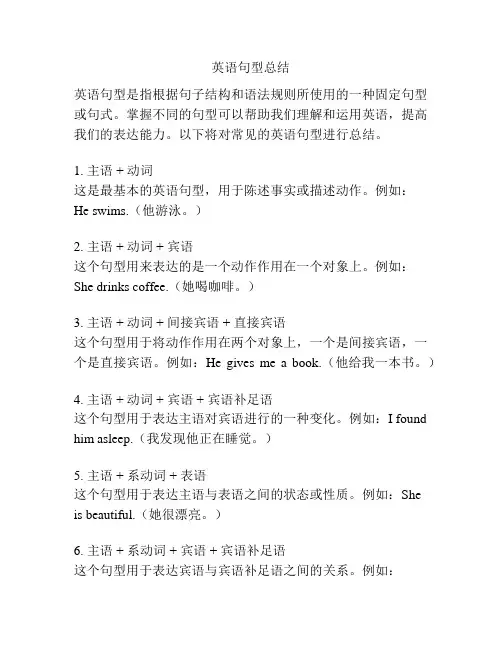
英语句型总结英语句型是指根据句子结构和语法规则所使用的一种固定句型或句式。
掌握不同的句型可以帮助我们理解和运用英语,提高我们的表达能力。
以下将对常见的英语句型进行总结。
1. 主语 + 动词这是最基本的英语句型,用于陈述事实或描述动作。
例如:He swims.(他游泳。
)2. 主语 + 动词 + 宾语这个句型用来表达的是一个动作作用在一个对象上。
例如:She drinks coffee.(她喝咖啡。
)3. 主语 + 动词 + 间接宾语 + 直接宾语这个句型用于将动作作用在两个对象上,一个是间接宾语,一个是直接宾语。
例如:He gives me a book.(他给我一本书。
)4. 主语 + 动词 + 宾语 + 宾语补足语这个句型用于表达主语对宾语进行的一种变化。
例如:I found him asleep.(我发现他正在睡觉。
)5. 主语 + 系动词 + 表语这个句型用于表达主语与表语之间的状态或性质。
例如:Sheis beautiful.(她很漂亮。
)6. 主语 + 系动词 + 宾语 + 宾语补足语这个句型用于表达宾语与宾语补足语之间的关系。
例如:They elected him president.(他们选举他为总统。
)7. There + be + 主语 + 宾语这个句型用于描述某个地点存在某个人或物。
例如:There is a book on the table.(桌子上有一本书。
)8. 主语 + hope/wish + 从句这个句型用于表达希望或愿望。
例如:I hope (that) you can come to my party.(我希望你能来参加我的聚会。
)9. It + 系动词 + 形容词 + 从句这个句型用于描述事物的状态或性质。
例如:It is important (that) you study hard.(你努力学习是重要的。
)10. 主语 + cannot/can't + 动词原形这个句型用于表达主语没有做某个动作的能力。
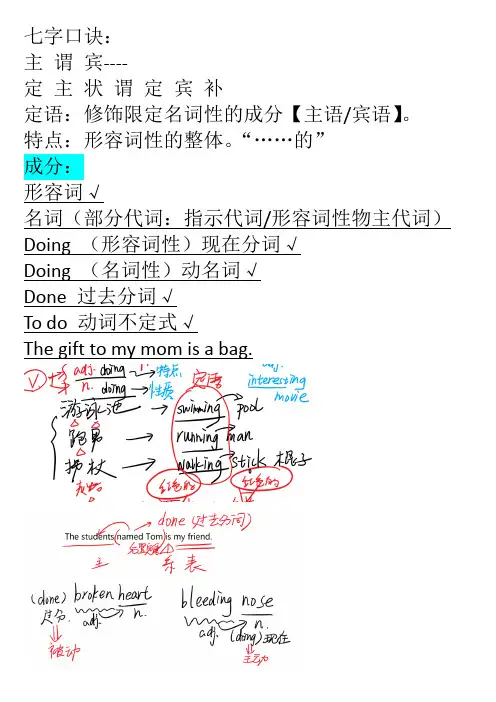
七字口诀:主谓宾----定主状谓定宾补定语:修饰限定名词性的成分【主语/宾语】。
特点:形容词性的整体。
“……的”成分:形容词√名词(部分代词:指示代词/形容词性物主代词)Doing (形容词性)现在分词√Doing (名词性)动名词√Done 过去分词√To do 动词不定式√The gift to my mom is a bag.补语:补充说明宾语的成分!补语和定语相比较:共同点:结构一致!!不同点:(1)出现位置(2)发生顺序举例:I hit his head broken and bleeding.状语:对句子的状态或者谓语动词的状态作修饰的语言。
特点:副词性短语。
“……地”判定法则:除了表达意思完整或者结构完整的主谓宾/主系表以外的所有剩余成分都是状语!并且一旦句末出现了状语,那么一状则状。
【一旦出现了状语后面全部都是状语!】I swim fastI jump higherI read quicklyTake it in your hand.构成原则:【介词+名词】/【副词】出现原则:句首:状语,句子。
句尾:句子(,)状语。
句中(句子中间放副词):实前情/be/助后实义动词前:I always eat bananas.I sometimes go to the bed later.情态动词后:I can never fly.I can’t never walk.be动词后:I am never a clever boy.I am always a beautiful girl.助动词后:I have already finished the job. She has already prepared the test.主系表--六字口诀定主状系定表。
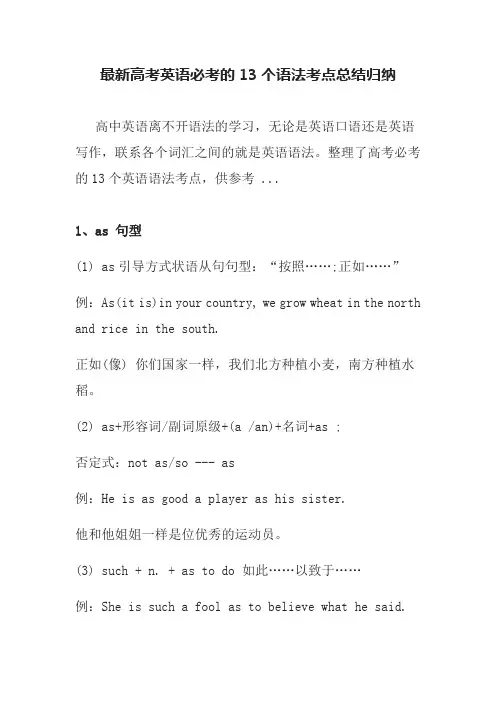
最新高考英语必考的13个语法考点总结归纳高中英语离不开语法的学习,无论是英语口语还是英语写作,联系各个词汇之间的就是英语语法。
整理了高考必考的13个英语语法考点,供参考 ...1、as 句型(1) as引导方式状语从句句型:“按照……;正如……”例:As(it is)in your country, we grow wheat in the north and rice in the south.正如(像) 你们国家一样,我们北方种植小麦,南方种植水稻。
(2) as+形容词/副词原级+(a /an)+名词+as ;否定式:not as/so --- as例:He is as good a player as his sister.他和他姐姐一样是位优秀的运动员。
(3) such + n. + as to do 如此……以致于……例:She is such a fool as to believe what he said.她是一个如此的一个笨蛋以致相信了他所说的话。
(4) so + adj./adv. + as to do sth 如此……以致于……例:He was so strong as to carry the heavy box.他是如此的强壮以致于能提起那重箱子。
(5) such...as... 象……之类的…… (接名词或定语从句) 例:He wished to be such a man as Lei Feng was.他希望成为一个像雷锋这样的人。
(6) the same +名词+as 和……一样的…… (接名词或定语从句)例:He is not the same man as he used to be.他不是从前的那样子了。
(7) as 引导非限制性定语从句例:As is known to us, knowledge is power.众所周知,知识就是力量。
(8)引导时间状语从句,与while意义相近例:We get wiser as we get older.随着我们长大,我们也变得越来越聪明。
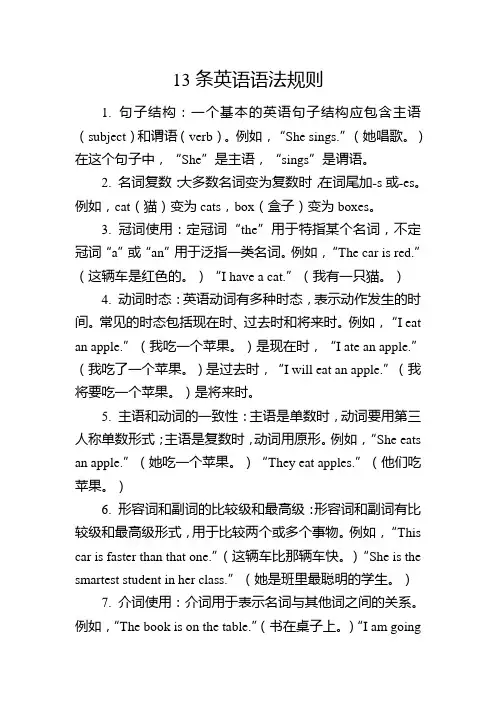
13条英语语法规则1. 句子结构:一个基本的英语句子结构应包含主语(subject)和谓语(verb)。
例如,“She sings.”(她唱歌。
)在这个句子中,“She”是主语,“sings”是谓语。
2. 名词复数:大多数名词变为复数时,在词尾加-s或-es。
例如,cat(猫)变为cats,box(盒子)变为boxes。
3. 冠词使用:定冠词“the”用于特指某个名词,不定冠词“a”或“an”用于泛指一类名词。
例如,“The car is red.”(这辆车是红色的。
)“I have a cat.”(我有一只猫。
)4. 动词时态:英语动词有多种时态,表示动作发生的时间。
常见的时态包括现在时、过去时和将来时。
例如,“I eat an apple.”(我吃一个苹果。
)是现在时,“I ate an apple.”(我吃了一个苹果。
)是过去时,“I will eat an apple.”(我将要吃一个苹果。
)是将来时。
5. 主语和动词的一致性:主语是单数时,动词要用第三人称单数形式;主语是复数时,动词用原形。
例如,“She eats an apple.”(她吃一个苹果。
)“They eat apples.”(他们吃苹果。
)6. 形容词和副词的比较级和最高级:形容词和副词有比较级和最高级形式,用于比较两个或多个事物。
例如,“This car is faster than that one.”(这辆车比那辆车快。
)“She is the smartest student in her class.”(她是班里最聪明的学生。
)7. 介词使用:介词用于表示名词与其他词之间的关系。
例如,“The book is on the table.”(书在桌子上。
)“I am goingto the store with my friend.”(我要和我的朋友去商店。
)8. 代词的使用:代词用于代替名词,以避免重复。
例如,“I like this car. It is fast.”(我喜欢这辆车。
13个英语句型含高中全部语法下面的13个句型涉及到几乎高中全部语法内容,在各个题型中均常出现。
1 as 句型(1) as引导方式状语从句句型:“按照……;正如……”例:As(it is)in your country, we grow wheat in the north and rice in the south. 正如(像) 你们国家一样,我们北方种植小麦,南方种植水稻。
(2) as+形容词/副词原级+(a /an)+名词+as ;否定式:not as/so --- as例:He is as good a player as his sister.他和他姐姐一样是位优秀的运动员。
(3) such + n. + as to do 如此……以致于……例:She is such a fool as to believe what he said.她是一个如此的一个笨蛋以致相信了他所说的话。
(4) so + adj./adv. + as to do sth 如此……以致于……例:He was so strong as to carry the heavy box.他是如此的强壮以致于能提起那重箱子。
(5) such...as... 象……之类的…… (接名词或定语从句)例:He wished to be such a man as Lei Feng was.他希望成为一个像雷锋这样的人。
(6) the same +名词+as 和……一样的…… (接名词或定语从句) 例:He is not the same man as he used to be.他不是从前的那样子了。
(7) as 引导非限制性定语从句例:As is known to us, knowledge is power.众所周知,知识就是力量。
(8)引导时间状语从句,与while意义相近例:We get wiser as we get older.随着我们长大,我们也变得越来越聪明。
句型常见的英语句型及其用法英语是世界上使用最广泛的语言之一,掌握常见的句型和用法对于学习英语至关重要。
在这篇文章中,我们将介绍一些常见的英语句型及其用法,以帮助您提高英语表达能力。
一、肯定句句型1. 主语 + 动词(be)+ 形容词例句:She is beautiful.用法:用来描述人或物的特征和状态。
2. 主语 + 动词(be)+ 名词例句:He is a doctor.用法:用来描述人的职业或身份。
3. 主语 + 动词(do/does/did)+ 动词原形例句:They do their homework every day.用法:用于表示经常性的动作或习惯。
4. 主语 + 动词(have/has/had)+ 过去分词例句:I have finished my work.用法:用来表示已完成的动作或状态。
5. 主语 + 动词 + 宾语例句:She loves her dog.用法:用来表示动作的主体和对象。
二、否定句句型1. 主语 + 动词(be)+ not + 形容词例句:They are not happy.用法:用来表示否定的状态或特征。
2. 主语 + 动词(do/does/did)+ not + 动词原形例句:He does not like coffee.用法:用来表示否定的动作或习惯。
3. 主语 + 动词(have/has/had)+ not + 过去分词例句:We have not seen the movie.用法:用来表示否定的已完成动作或状态。
4. 主语 + do/does/did + not + 动词原形 + 宾语例句:She does not drink milk.用法:用来表示否定的动作和对象。
三、疑问句句型1. 助动词(be/do/does/did) + 主语 + 动词原形 + 其他?例句:Are you going to the party?用法:用来询问具体的情况或行动。
中学英语语法记忆顺口溜教你巧学巧记:句子成分巧划分英语简洁句共有五种根本句型。
成千上万个英语句子都是这五种句型的扩大或缩小演化而成的。
英语句子成分的划分方法与汉语大不一样,尤其是谓语局部更困难。
因为英语动词有四大类,而且各类动词的功能也不尽一样。
下面我们就划分英语句子成分的方法,利用口诀加实例的形式进展综述:主在前、谓在中,宾语、状语后面冲①。
短语定语主宾后,形、代定语主宾前②。
间宾直宾紧相依,直、间之间to、for连③。
宾补位于宾语后,地状常在时状前④。
例1.We are going to have physics next term.主语(在句首) 谓语(在句子中间) 宾语状语(在句子末尾)上述句子成分的划分用上了第①句口诀,结合上述句子剖析口诀①:(A)主在前:指主语常位于一个句子的前面(即句首);(B)谓在中:指谓语常位于一个句子的中间(尤其指主要谓语动词);(C)宾语、状语后面冲:指宾语、状语位于句子的尾部,好像打仗兵、卒在后面冲一样。
例2.Our politics teacher often tells us(物主代词作)定语主语(副词作)状语谓语(人作)间宾a story about Comrade Lei Feng on Saturdays.(事物作)直宾语(介词短语作后置)定语状语上面这个句子成分的划分用上了口诀第②句和第③句,现将这两句口诀说明如下:(A)短语定语主宾后:指介词短语或其他短语在句中作定语常放在主语或宾语的后面。
如上句中的about Comrade Lei Feng作定语就是在宾语a story的后面。
(B)形、代定语主宾前:指形容词、代词作定语常位于一个句子的主语或宾语的前面。
如上句中our 这个形容词性物主代词就放在politics teacher前面作定语。
(C)间宾直宾紧相依:指某些动词后面常接两个宾语〔即干脆宾语和间接宾语〕。
在通常状况下,表示人的名词或代词作间宾,表示物的名词或代词作直宾。
英语句式语法
以下是英语中常用的句式和语法:
1. 主语+谓语:这种句型中的谓语动词是不及物动词,后面不需要加宾语,例如:She smiled.
2. 主语+谓语+宾语:这种句型中的谓语动词是及物动词,需要加宾语,例如:I love you.
3. 主语+系动词+表语:这种句型中的谓语动词是系动词,后面需要加表语,例如:She is beautiful.
4. 主语+谓语+间接宾语+直接宾语:这种句型中的谓语动词是双宾语动词,需要加间接宾语和直接宾语,例如:He gave me a book.
5. 主语+谓语+宾语+宾语补足语:这种句型中的谓语动词是复合宾语动词,需要加宾语和宾语补足语,例如:They kept the room clean.
6. 祈使句:这种句型表示请求、命令或建议等,例如:Please open the door.
7. 倒装句:这种句型表示强调、对比、突出等,例如:Here comes the bus.
8. 并列句:这种句型由两个或两个以上的简单句组成,例如:I like English and she likes math.
9. 省略句:这种句型省略了某些不必要的部分,例如:Let’s go (to the park).
10. 强调句:这种句型强调某个成分,例如:It was she who helped me. 以上是英语中常用的句式和语法,希望能对您有所帮助。
语法常用句型总结语法句型是构建一个完整、流畅的句子所必需的基本元素。
掌握常用的语法句型能够帮助我们有效地表达自己的观点和思想。
本文将总结一些常用的语法句型,以帮助您提升写作和口语表达能力。
一、主语 + 动词句型1. 主语 + 动词:主语在句中承担动作发起者的角色,动词描述主语的行为或状态。
例如:I study English every day.(我每天学习英语。
)2. 主语 + be 动词:be 动词用来表示主语的身份、状态或特征。
例如:She is a doctor.(她是一名医生。
)3. 主语 + 动词 + 宾语:主语执行动作作用于宾语。
例如:They eat lunch together.(他们一起吃午餐。
)二、主语 + 动词 + 宾语 + 宾补句型1. 主语 + 动词 + 宾语 + 宾补(形容词):宾补用来描述宾语的状态或特征。
例如:I find the movie interesting.(我觉得这部电影很有趣。
)2. 主语 + 动词 + 宾语 + 宾补(名词):宾补用来表示宾语的身份或性质。
例如:They elected him president.(他们选举他为总统。
)三、主语 + 动词 + 间接宾语 + 直接宾语句型1. 主语 + 动词 + 间接宾语 + 直接宾语:直接宾语是动作的承受者,间接宾语是动作的受益者。
例如:He gave me a present.(他给了我一个礼物。
)四、主语 + 系动词 + 表语句型1. 主语 + 系动词 + 表语(形容词):系动词用来连接主语和表语,表达主语的特征或状态。
例如:She looks happy.(她看上去很开心。
)2. 主语 + 系动词 + 表语(名词):系动词用来描述主语的身份或职业。
例如:He is a teacher.(他是一名老师。
)五、主语 + 不及物动词句型1. 主语 + 不及物动词:不及物动词表示主语的行为或状态,不需要宾语来辅助说明。
英语语法口诀大全1. 主谓一致:主语单数谓语用单数,主语复数谓语用复数。
2. 时态要一致:动词时态与句子时态相符,如过去时,现在时,将来时。
3. 形容词用法顺序:限定词 - 描绘词 - 数词 - 大小 - 年龄 - 形状 - 颜色 - 国籍 - 材料 - 功能。
4. 不定代词:all, both, each, every, either, neither, none, one, some, any, most等,谓语用单数。
5. 现在完成时,关键用过去完成时的概念,但动作发生在过去。
6. 用逗号分离:起承转合,逗号为友。
7. 分号使用:两个完整的句子却不使用连词,分号致之。
8. 使用虚拟语气:要用"should", "were", "would"来表示虚拟。
9. 名词所有格:一般加's,以s结尾的加',两个名词所有格后边只需加一个's。
10. 定语从句:关系词+陈述句前半部分,关系词在定语从句中充当主语、宾语、表语、定语等。
11. 宾语从句:I know时态不变,陈述语序,一般疑问句用陈述语序回答,特殊疑问句不能用whether/if。
12. 否定反意疑问句:前肯后否,提问用肯标前,否标后。
13. 状语从句:时间、原因、条件、结果四句型,时间放句首,其他放句尾,先因后果,先果后因。
14. 名词的形式:名词变复数-s,大部分去s,以-o,-x,-sh,-ss, -ch结尾加es。
15. 不可数名词前加修饰语:Water, bread alone不行。
这只是一些常见的英语语法口诀,实际上英语语法非常复杂广泛,还有许多其他的规则需要掌握和运用。
掌握基本的语法规则是学习英语的基础,但也需要在实际应用中灵活运用。
1. as 句型(1) as引导方式状语从句句型:“按照……;正如……”例:As(it is)in your country, we grow wheat in the north and r ice in the south.正如(像) 你们国家一样,我们北方种植小麦,南方种植水稻。
(2) as+形容词/副词原级+(a /an)+名词+as ;否定式:not as/so --- as例:He is as good a player as his sister.他和他姐姐一样是位优秀的运动员。
(3) such + n. + as to do 如此……以致于……例:She is such a fool as to believe what he said.她是一个如此的一个笨蛋以致相信了他所说的话。
(4) so + adj./adv. + as to do sth 如此……以致于……例:He was so strong as to carry the heavy box.他是如此的强壮以致于能提起那重箱子。
(5) such...as... 象……之类的……(接名词或定语从句)例:He wished to be such a man as Lei Feng was.他希望成为一个像雷锋这样的人。
(6) the same +名词+as 和……一样的……(接名词或定语从句)例:He is not the same man as he used to be.他不是从前的那样子了。
(7) as 引导非限制性定语从句例:As is known to us, knowledge is power.众所周知,知识就是力量。
(8)引导时间状语从句,与while意义相近例:We get wiser as we get older.随着我们长大,我们也变得越来越聪明。
(9) 引导原因状语从句,与because的用法相近例:As it was getting very late, we soon turned back.因为越来越迟了,所以我们不久就回来了。
(10) 引导让步状语从句例:Child as he is, he knows much about science.尽管他是一个小孩,但他对科学了解得很多。
2. prefer 句型(1) prefer to do sth例:I prefer to stay at home.我宁愿呆在家里。
(2) prefer doing sth例:I prefer playing in defence.我喜欢打防守。
(3) prefer sb to do sth例:Would you prefer me to stay?你愿意我留下来吗?(4) prefer to do sth rather than do sth ……宁愿…...而不愿...例句:I prefer to stay at home rather than go out.我宁愿呆在家里而不愿出去.(5) prefer doing sth to doing sth例:I prefer watching football to playing it.我喜欢看篮球,不喜欢打篮球。
(6) prefer sth to sth例:I prefer tea to coffee.我要茶不要咖啡。
3. when 句型(1) be doing sth...when...例:He was still smiling when the door opened and his wife cam e in.他正笑着的时候门突然开了,他妻子走了进来。
(2) be about to do sth ... when ...例:We were about to start when it began to rain.我们刚要出发,天就开始下雨了。
(3) had just done ... when ...例:I had just gone to bed after a very hard day when the ph one rang.在劳累了一天之后我刚刚就寝,电话铃就响了。
4. seem 句型(1) It +seems + that从句例:It seemed that everyone was satisfied.看来好像每个人都很满意。
(2) It seems to sb that ...例:It seems to me that she is right.我看她是对的,(3) There seems to be ...例:There seems to be a heavy rain.看上去要有一场大雨。
(4) It seems as if ...例:It seemed that she couldn't come to class.看样子她不能来上课了。
5. 表示“相差……;增加了……;增加到……”句型(1) She is taller than I by three inches.她比我高三英寸(2) There is one year between us.我们之间相差一岁。
(3) She is three years old than I.她比我大三岁。
(4) They have increased the price by 50%.他们把价格上涨了50%(5) His salary has rised to 10,000 yuan per month.他的工资已经涨到了每月10,000元。
6. what 引导的名词性从句(1) what 引导主语从句例:What surprised me is that everybody seemed to be very indif ferent to her.让我吃惊的是每个人似乎对她都很冷淡。
[ indifferent adj.不关心的;冷漠的](2) what 引导宾语从句例:We can learn what we do not know.我们能学会我们不懂的东西。
(3) what 引导表语从句例:That is what I want.那正是我所要的。
(4) what 引导同位语从句例:I have no idea what they are talking about.我不知道他们正在谈论什么。
7. too句型(1) too ... to do ...例:Politics is too important to be left to the politicians.(=Po litics is so important that it can't be left to the politi cians.)政治太重要了,不能由政治家来决定。
(2) only too ... to do ...例:I shall be only too pleased to get home.我要回到家里就非常高兴。
(3) too + adj + for sth例:These shoes are much too small for me.我穿这双鞋太小了。
(4) too + adj + a + n.例:This is too difficult a text for me. 这篇课文对我来说太难了。
(5) can't …too +形容词无论……也不为过例:We cannot emphasize the importance of protecting our eyes to o much.我们再怎么强调保护眼睛的重要性也不为过。
8. where 句型(1) where 引导的定语从句例:This is the house where he lived last year.这就是他去年住过的房子。
(2) where 引导的状语从句例:Where there is a will,there is a way.有志者事竟成。
He left his key where he could find.他将钥匙放在易找到的地方。
I will go where I want to go.我要去我想去的地方。
(3) where 引导的表语从句例:This is where you are wrong.这正是你错的地方。
9. wish 句型(1) wish that sb did sth 希望某人现在做某事例:I wish I were as strong as you.我希望和你一样强壮。
(2) wish that sb had done sth 希望某人过去做某事例:I wish you had told me earlier要是你早点告诉我就好了。
(3) wish that sb would/could do sth 希望某人将来做某事例:I wish you would succeed this time.我希望你这次会成功。
10. would rather 句型(1) would rather do sth than do sth 宁愿做……而不愿做……例:She would rather die than turn against his motherland. 她宁可死也不去背叛祖国。
(2) would rather have done sth 宁愿过去做过某事例:I would rather have taken his advice.我宁愿过去接受他的意见。
(3) would rather sb had done sth 宁愿某人过去做过某事例:I would rather I had passed the examination last week. 我真希望通过上星期的考试。
(4) would rather sb did sth 宁愿某人现在或将来做某事例:Who would you rather went with you?你宁愿谁和你一起去?11. before 句型(1) before sb can/ could …某人还没来得及……例:Before I could get in a word ,he had measured me.我还没来得及插话,他就给我量好了尺寸。
(2) It will be +时间+ before + 还有多长时间……例:It will be 4 years before he graduates.他还有四年时间变毕业了。
(3) had done some time before (才……)例:We had sailed four days and four nights before we saw land. 我们航行了四天四夜才见到陆地。